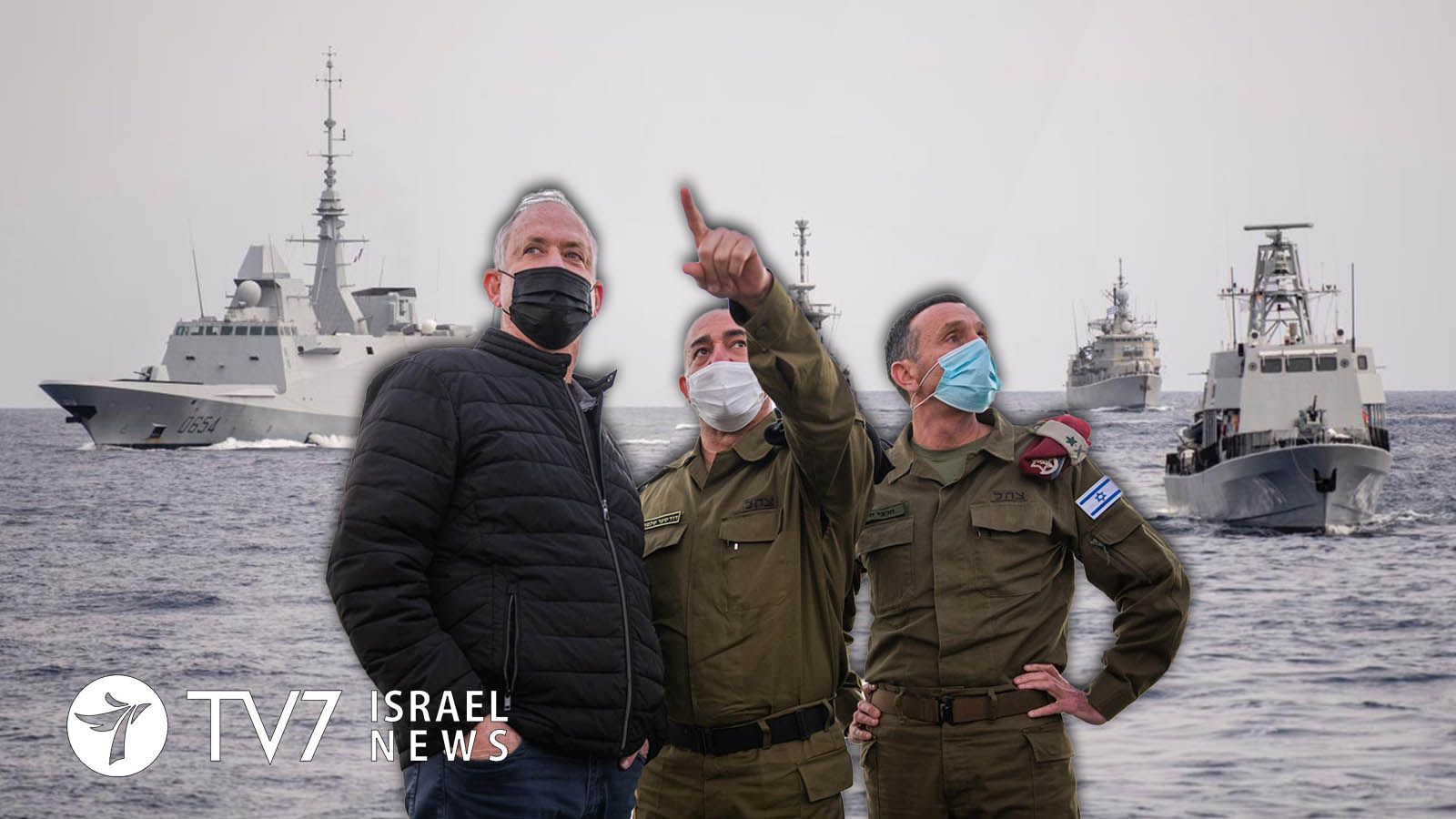Defense Minister Benny Gantz joined IDF Deputy Chief of Staff Major General Herzi Halevi and Commander of the Israeli Navy Major General David Sa’ar Salama for a security situation assessment and a tour of a Sa’ar Class 6 Frigate, which recently joined the ranks of Israel’s maritime forces.
By Jonathan Hessen and Erin Viner
Jerusalem’s top defense official stressed that Israel continues to bolster its cooperation with the United States, along other nations, against threats emanating from enemy states and terror organizations both near and far, for the purpose of ensuring superiority in the maritime domain, and if need be, also for the purpose of an offensive.
The inspection of the Israeli naval base came just one day after visiting-Commander of the US Naval Forces Central Command (NAVCENT) Vice Admiral Brad Cooper concluded a tour of his own. Admiral Cooper praised the significant advancements made by the Israeli navy, which developed its capabilities to ensure the security of Israel’s strategic assets – including its offshore gas rigs and “other” infrastructure.
In related developments, alongside a number of joint exercises in the Red Sea by the Israeli Navy and American vessels belonging to the 5th Fleet, the US has also increased the number of maritime drills with the Egyptian Navy described by NAVCENT as demonstrative of “strong bilateral ties between the two navies.” The Red Sea is a strategically sensitive waterway which serves as the main route for oil and trade between Europe and the East, as well as a major trade outlet for Sudan, Ethiopia, Egypt, Jordan and Israel.
And while an increase of naval maneuvers by the US Naval Forces Central Command with its regional partners and global allies aims to deter hostile forces from threatening the strategic waterway, the Iran-backed Houthi rebels in Yemen are seemingly raising risks to freedom of navigation. The Islamist radical movement hijacked a United Arab Emirates-flagged cargo vessel en route to the Saudi port of Jizan last Monday, off the Western Yemeni port of al-Hudaydah according to Brigadier General Turki al-Malki, who is the spokesman for the Saudi-led coalition battling the Houthis.
With assistance from Iran’s Islamic Revolutionary Guards Corps (IRGC), Houthi insurgents have managed to capture majority of the most populous western parts of Yemen. Since February of 2021, they have engaged in an offensive aimed at capturing the Ma’rib Governorate, which is the last significant territory under the Saudi-backed government of Yemen’s President Abdrabbuh Mansur Hadi. Despite major territorial losses, pro-government forces managed to mount a counter-attack in recent days with robust aerial support from the Saudi-led coalition, managing to repel the militants from the energy-rich Shabwa province.
It is important to note, however, that the battle between the Hadi government and the Houthis is far from over. Diplomatic efforts led by the United Nations to secure a ceasefire have repeatedly been rejected by the Houthis, who have pledged to seize the entire country by force.
Signaling Iran’s apparent intention to deepen involvement in Yemen, last month the Islamic Republic’s Foreign Minister Hossein Amirabdollahian, declared announced his nation’s opposition to “any sort of partition of regional and Islamic countries” proposed by world powers.
The Ayatollah regime’s top diplomat is currently in Beijing, where he is set to meet with his Chinese counterpart, State Councilor and Foreign Minister Wang Yi. And while the ongoing nuclear negotiations in Vienna will be a topic of discussion, China’s Foreign Ministry Spokesman Wang Wenbin noted Beijing’s “long-standing and profound friendship” with Iran, and further asserted readiness “to work with Iran to further deepen the China-Iran comprehensive strategic partnership to the benefit of our two countries and two peoples.”
The visit comes just two days after Beijing’s top diplomat held a meeting with his Saudi counterpart Prince Faisal bin Farhan Al Saud in Wuxi city of East China’s Jiangsu Province, where he hosted a subsequent meeting with the Foreign Ministers of the Gulf Cooperation Council (GCC).
